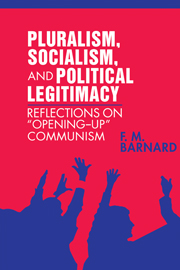Book contents
- Frontmatter
- Contents
- Preface
- 1 Introduction
- 2 The Context
- 3 Socialist pluralism and pluralist socialism
- 4 Ideological differentiation under socialism
- 5 Socialism and the language of sentiment
- 6 Socialism and the language of rationality
- 7 Socialism, politics, and citizenship
- 8 Conclusion
- Appendix: Electoral confrontation under socialism
- Index
7 - Socialism, politics, and citizenship
Published online by Cambridge University Press: 25 January 2010
- Frontmatter
- Contents
- Preface
- 1 Introduction
- 2 The Context
- 3 Socialist pluralism and pluralist socialism
- 4 Ideological differentiation under socialism
- 5 Socialism and the language of sentiment
- 6 Socialism and the language of rationality
- 7 Socialism, politics, and citizenship
- 8 Conclusion
- Appendix: Electoral confrontation under socialism
- Index
Summary
It is from the perspective of politically legitimating socialism as a civic order that Klokočka's reforming vision seems to me the most remarkable among the diverse Czechoslovak reform proposals of the late 1960s. To my knowledge, it is also the most detailed “insider's” critique of the defects of nominally socialist systems as political systems. I shall attempt, therefore, in this chapter to draw out of his critique of “monistic” socialism and his prognosis of a pluralist socialism those theoretical points that may help to supplement and, possibly, further clarify the line of argument pursued in the last two chapters.
“Command” socialism and Klokočka's critique
The hitherto existing command system totally misconceives, according to Klokočka, the nature and function of politics. This misconception derives from the erroneous belief that, unlike capitalist society, socialist society entails societal unity. Given this belief, elections – Klokočka's chief concern - cease to carry political meaning. The alternatives open to public choice are personal, not political alternatives. By having lost what Klokočka describes as their defining “pluralistic essence,” elections, strictly speaking, become otiose; they become empty rituals, indistinguishable from May Day parades. For what in fact takes place is the transformation of political elections into promotional and symbolic exercises. Instead of disclosing where popular support lies, May Day elections merely serve to advertise existing power holders.
Klokočka's central argument is that the assumption of spontaneous social unity underlying monistic socialism spells the doom of politics as the domain of public choice.
- Type
- Chapter
- Information
- Pluralism, Socialism, and Political LegitimacyReflections on Opening up Communism, pp. 119 - 138Publisher: Cambridge University PressPrint publication year: 1992



